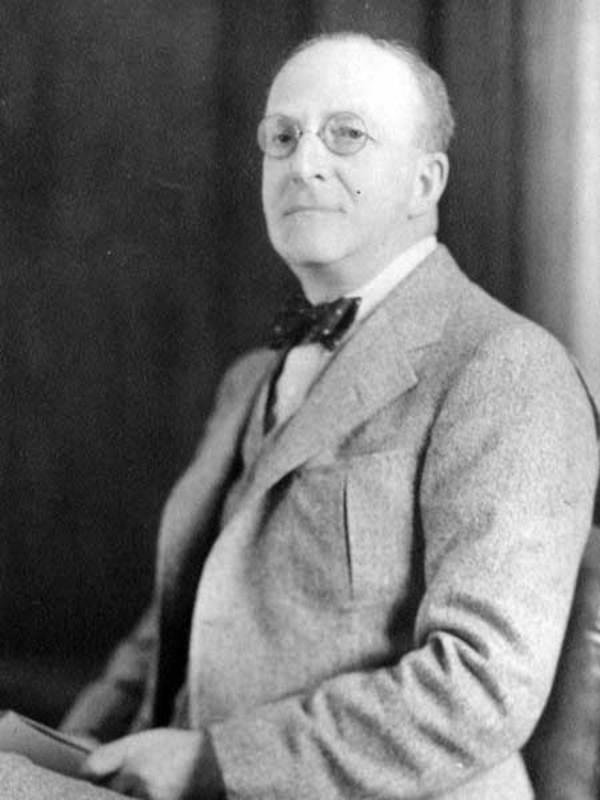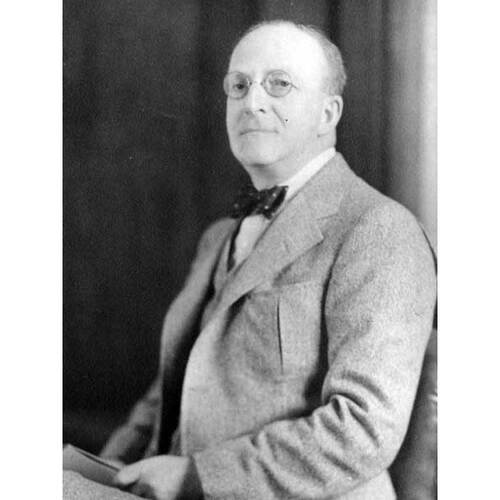
Source: Link
HYMAN, Marcus, lawyer, educator, politician, and Jewish community leader; b. 13 July 1883 near Vilna (Vilnius, Lithuania), son of Aaron Hyman, a rabbi and author, and Rachel Abrahamson; m. 18 Aug. 1914 in Winnipeg Erna Ziembiska (von Ziembinska) of Berlin, Germany, and they had one son; d. 31 Dec. 1938 in Winnipeg.
Marcus Hyman immigrated with his family to England in 1885 and they subsequently became naturalized British subjects. One of ten children, he was raised in London. His father, a rabbinical scholar of international reputation, refused to let him play with other boys. Instead, Marcus, who as a young child spoke only Hebrew, spent his time in his father’s library. He received his primary and secondary education in London and distinguished himself as a brilliant student, winning scholarships. He was one of only six London students to be awarded the senior London County Council scholarship to Oxford in 1902.
During his years at Worcester College, Oxford, from 1902 to 1906, Hyman won five scholarships and he graduated with honours, an ma, and an llb. In 1907 he travelled to India to become tutor to Prince Shivajirao Gaekwad (Gaekwar) and private secretary to his father, Sayajirao Gaekwad (Gaekwar) III, the Maharaja of Baroda (Vadodara, India), after learning of the positions from the college dean. He returned to London in 1910, and was called to the bar from Gray’s Inn. In 1912 he was appointed financial adviser to the Investment Registry Limited in London.
Hyman immigrated to Canada in the fall of 1913. He may have chosen to settle in Winnipeg because an uncle lived there. Moses Abrahamson was president of the company that published the Yiddish newspaper, Yid [Israelite], and a former interpreter for the federal government. Hyman was called to the Manitoba bar later that year, and began a distinguished career as a criminal-defence lawyer. He would work alone or in partnership; his longest-lasting association would be with Joseph Hestrin from 1924 to 1933. From 1915 until his death, his office was located in the McIntyre Block in downtown Winnipeg. In addition to practising, he lectured in international law, the history of English law, and jurisprudence at the Manitoba Law School from 1915 to 1921. He would be appointed a kc on 1 Jan. 1937.
Shortly after his arrival in Winnipeg, Hyman had become involved in the city’s Jewish community, which had numbered 9,023 in 1911, almost 90 per cent of whom lived in the North End. From 1916 to 1922 he was president of the western branch of the Canadian Jewish Committee for the Relief of War Sufferers, which would raise $500,000 to help European Jews displaced by World War I, the Russian civil war, and pogroms. On 11 May 1919 he sent Prime Minister Sir Robert Laird Borden a telegram on behalf of the branch demanding that the Paris Peace Conference bring about the cessation of pogroms in Poland. On 9 December he co-presided at a meeting of thousands of Winnipeg Jews protesting against massacres in Ukraine and Poland and calling for Canadian government intervention. During the war he had been chairman of the Winnipeg committee of the British and Canadian Recruiting Mission, which assembled several units of Canadian Jews for service in Egypt and Palestine. By 1917 he had become one of the leaders of Winnipeg’s Poale Zion (Labour Zionism) movement, which favoured the creation of a democratic socialist Jewish homeland in Palestine. On 2 March 1919 he was chosen as a delegate to the Canadian Jewish Congress in Montreal, held from 16 to 19 March. There, he chaired the general resolutions committee.
In the wake of the Winnipeg General Strike [see Mike Sokolowiski*], Hyman, a brilliant lawyer sympathetic to organized labour and immigrants, was appointed by the Trades and Labor Council as a counsel for the strike leaders at their preliminary hearings. He also acted for five “alien foreigners,” three of whom were Jews who were arrested at the same time as the strike leaders and who appeared before an immigration board of inquiry. Hyman believed that “there never was and never had been” any relation between the aliens and the strike, and claimed that their arrest was a deliberate attempt “to besmirch the name of the strike leaders.” His defence of one of the men, Moses (Solomon) Almazoff (Almazov), a University of Manitoba student, journalist, and left-wing activist, helped make him a household name in the Winnipeg Jewish community.
In 1919, with his legal partner Joseph Alter Cherniack, Hyman unsuccessfully requested that the chief press censor of Canada, Ernest John Chambers*, lift a ban that prohibited Volkstimme [People’s Voice], a left-wing Yiddish newspaper in Winnipeg, from being published and permit it to be issued under a new name. Hyman, who was described by Chambers to Angus Alexander McLean, comptroller of the Royal North-West Mounted Police, as “the chief counsel for the Socialist agitators … undergoing trial,” also represented the publishers of Neue Zeit/New Day, another Yiddish-language newspaper in Winnipeg; Chambers reluctantly allowed it to be published.
Although Hyman had been interested in municipal and provincial politics since 1914, he became active only after he joined the social democratic Independent Labor Party, formed in Winnipeg in 1920. Three years later, campaigning as an ILP candidate, he was elected in Ward 3 as a trustee for the Winnipeg School Board; he served from 1924 to 1929 and was a member of several standing committees, including those for finance and building. In 1929 he ran unsuccessfully for mayor, placing second in a three-man contest; he lost to Ralph Humphreys Webb by almost 9,000 votes. In 1930 he lost to Webb by more than 10,000 votes in a two-man contest. In both instances he won Ward 3 in the North End, but did not prevail in the central and southern wards. Although latent anti-Semitism may have been a factor, the division left in the wake of the general strike and Hyman’s association with the strikers and organized labour may have made a larger contribution to his defeat.
Hyman had failed in his attempt to obtain a seat in the Legislative Assembly in the provincial election of 1927 for the riding of St Boniface, but he was victorious in 1932 as one of ten representatives for the multi-member constituency of Winnipeg. He was re-elected, running ninth in a field of 21 (tenth on the final count), as a Co-operative Commonwealth Federation candidate in 1936. His strength was overwhelmingly in the North End. Lloyd Cleworth Stinson, a contemporary member of the CCF, described him as “one of the most respected members of the House … [who] dealt with a variety of subjects, including education, civil liberties and improvements in labour legislation. Twenty years ahead of his time in education, he was an active supporter of larger school units, something that was still being debated in the 1950s.” As well, Hyman spoke in the legislature on topics such as the reluctance of the government of Premier John Bracken* to continue to pay for the upkeep of the official residence of the lieutenant governor; his comments placed him among the staunch defenders of the office of the crown’s representative.
In January 1934, at the second Canadian Jewish Congress in Toronto, Hyman spoke on “A survey of the Jewish world situation.” His presentation made a favourable impression and was widely quoted in the press. He expressed his concern about the virulent anti-Semitism of the Nazi Party in Germany and its manifestation in Manitoba, the Canadian Nationalist Party, formed in Winnipeg by William Whittaker the previous September. The Manitoba group issued an anti-Semitic mimeographed sheet entitled the Canadian Nationalist (Winnipeg). Noting in the Legislative Assembly on 20 March 1934 that it was becoming increasingly difficult “to restrain some of our younger men from demonstrating their enraged resentment of these foul libels propagated against my people,” Hyman introduced legislation to curb what he labelled “the filthy and scurrilous publication of these racketeers.”
The Act to amend “The Libel Act,” also known as the Manitoba Defamation Act or the Hyman Act, was the first and, until 1970, the only group libel law in Canada. Under its provisions, an injunction to cease publication could be obtained against the author or editor of any material that defamed a racial or religious group or its members, citing not personal injury but the “hatred, contempt or ridicule” fostered against the group as a whole. If convicted, the defendants would be ordered to stop circulating the libels. Concurrently, Hyman sponsored an amendment to the Newspapers Act which made a publisher’s name mandatory on all pamphlets and handbills, intended to prevent the issuers from repeating the offence under a different name. In what historian Lita-Rose Betcherman terms an act of “enlightened self-interest,” the Bracken administration had supported the legislation. Its authority was being undermined by the Nationalists, who called for the abolition of provincial governments and challenged the ability of the attorney general to restrain their activities. The bills passed unanimously. An article in Whittaker’s sheet accusing Jews of practising ritual murder became the basis for the action brought almost immediately by William Verner Tobias, a Jewish war veteran and former Conservative mla. Tobias won the case in February 1935; Whittaker and the printer were ordered to cease publication of such libels and Tobias was awarded $300 in costs.
Hyman, described by the editor of the Winnipeg Tribune as being “happiest in the kingdom of the mind,” at one time played the violin and enjoyed musical recordings, possessing what was considered one of the largest private collections in western Canada. He was also keenly interested in art, especially black and white prints and prints by Englishman George Baxter. He died of pneumonia in the Winnipeg General Hospital following an operation to remove a tumour. His funeral was held at Winnipeg’s Shaarey Zedek Synagogue. Among the honorary pall-bearers were Premier Bracken and Winnipeg mayor John Queen*. Rabbi Solomon Frank stated that Hyman had exemplified religion in action in striving for ideals of social justice and human betterment. He had been a strong supporter of the British empire with a deep understanding of the principles on which it had been founded: tolerance, democracy, and equality. The Winnipeg Tribune noted that Hyman’s “cultured speech made him one of the outstanding men of the Manitoba Legislature.” His death removed “one of Winnipeg’s most individual, colorful and esteemed figures.” He was buried in the synagogue’s cemetery.
Man., Dept. of Tourism, Culture, Heritage, Sport and Consumer Protection, Vital statistics agency (Winnipeg), nos.1914-120210, 1938-051008. Jewish Post (Winnipeg), 5 Jan. 1939. Winnipeg Free Press, 31 Dec. 1938; 3, 4 Jan. 1939. Winnipeg Tribune, 31 Dec. 1938. L.‑R. Betcherman, The swastika and the maple leaf: fascist movements in Canada in the thirties (Toronto, 1975). Canadian Jewish yearbook (Montreal), 1939–40. The Jew in Canada: a complete record of Canadian Jewry from the days of the French régime to the present time, comp. A. D. Hart (Toronto and Montreal, 1926). L. [C.] Stinson, Political warriors: recollections of a social democrat (Winnipeg, 1975). H. M. Trachtenberg, “‘The old clo’ move’: anti-semitism, politics and the Jews of Winnipeg, 1882–1921” (phd thesis, York Univ., North York [Toronto], 1984).
Cite This Article
Henry Trachtenberg, “HYMAN, MARCUS,” in Dictionary of Canadian Biography, vol. 16, University of Toronto/Université Laval, 2003–, accessed December 30, 2025, https://www.biographi.ca/en/bio/hyman_marcus_16E.html.
The citation above shows the format for footnotes and endnotes according to the Chicago manual of style (16th edition). Information to be used in other citation formats:
| Permalink: | https://www.biographi.ca/en/bio/hyman_marcus_16E.html |
| Author of Article: | Henry Trachtenberg |
| Title of Article: | HYMAN, MARCUS |
| Publication Name: | Dictionary of Canadian Biography, vol. 16 |
| Publisher: | University of Toronto/Université Laval |
| Year of publication: | 2016 |
| Year of revision: | 2016 |
| Access Date: | December 30, 2025 |



